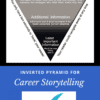Resume Australia:
Let’s be clear, ANYONE can write a resume! The internet is jam packed full of articles from self-professed experts about how to write and present a resume along with templates to use. The PROBLEM with all of this is that its confusing and a lot of it is INCORRECT in today’s job search market. This makes the task of writing your career marketing documents very difficult. Extensive recruitment expertise provides me with a firm understanding of precisely what employers and recruiters look for in candidates, resumes and job applications. For starters there is no “one size fits all” approach when it comes to the layout. Aside from the Personal Details, Branding Statement, Career Summary, Industry Keywords sections, the rest of the layout will depend on what you have done previously and what you are applying for now. With this in mind, steer clear of Resume Examples or Samples to give you guidance.
Your first page must be compelling and power packed; if you fail to capture the reader’s attention here they may not get to the second page. Resumes are all about highlighting the value you have to offer the employer-how you can add to their annual revenue, how you can increase production outputs or how you can add to their current suppliers. So for some clients, it’s of great value to have a Career Achievement section after the Industry Keywords section to capture attention. Many jobseekers in today’s job market fall into the trap of adding a laundry list of responsibilities or copying their PDs into Employment History. Your application will not stand out in the crowd if you follow this way of thinking.
Top 10 resume mistakes to avoid:
- Typos and grammatical errors– These errors stand out more than what is correct on your resume. Your documents need to be grammatically perfect. If it isn’t, employers will read between the lines and draw not-so-flattering conclusions about you, like: “This person can’t write,” or “This person obviously doesn’t care.”
- Objectives– These are outdated and should be replaced with an attention grabbing Career Summary or Profile. The main goal of a career summary is to immediately grab the hiring manager’s attention and share your most impressive qualifications, up front.
- No action verbs– Avoid using phrases like “responsible for, fluff or clichés” Instead, use action verbs: “Resolved user questions as part of an IT help desk serving 4,000 students and staff.”
- Leaving off important information– You may be tempted, for example, to eliminate mention of the jobs you think aren’t relevant to the types of positions you are applying for now or you’ve taken to earn extra money for school. What you inadvertently do when you leave positions out of your history is create gaps which send alarm bells to the reader. Typically, however, the soft skills you’ve gained from these experiences (e.g., work ethic, time management) are more important to employers than you might think.
- Visually too busy– If your resume is wall-to-wall text featuring five different fonts, wrong colour choice or graphics it will most likely give the employer a headache. So show your resume to several other people before sending it out-preferably someone with experience such as a recruiter or US. Do they find it visually attractive? If what you have is hard on the eyes, revise.
- Incorrect contact information– I once worked with a Sales Rep whose resume seemed incredibly robust, but she wasn’t getting any bites from employers. So one day, I jokingly asked her if the phone number she’d listed on her resume was correct. It wasn’t. Once she changed it, she started getting the calls she’d been expecting. This is a VERY common oversight. Moral of the story: Double-check even the most minute, taken-for-granted details — sooner rather than later.
- Lack of facts– Employers need to understand what you’ve done and accomplished. For example:
- Worked with employees in a retail setting.
- Recruited, hired, trained and supervised more than 20 employees in a sports store with $2 million in annual sales.
Both of these phrases could describe the same person, but the details and specifics in example B will more likely grab an employer’s attention.
- Highlighting duties instead of accomplishments– It’s easy to slip into a style where you simply start listing job duties on your resume. For example:
- Attended group meetings and recorded minutes;
- Worked with children in a day-care setting;
- Updated departmental files.
Blah, blah, blah-BORING! Employers, however, don’t care so much about what you’ve done as what you’ve accomplished in your various activities. They’re looking for statements more like these:
- Used laptop computer to record weekly meeting minutes and compiled them in a Microsoft Word-based file for future organisational reference.
- Developed three daily activities for preschool-age children and prepared them for a 10-minute holiday program performance.
- Reorganised 10 years’ worth of unmanageable files, making them easily accessible to department members.
- Too long or too short– Despite what you may read or hear, there are no real rules regarding resume length. Why? Because human beings, who have different preferences and expectations where resumes are concerned, will be reading it. That doesn’t mean you should start sending out five-page resumes, of course. Generally speaking, a minimum of 2 pages and a maximum of 4 pages should suffice. But don’t feel you have to use 4 pages if 3 will do. Conversely, don’t cut the meat out of your resume simply to make it conform to 4 pages.
- Attempting the “One–size–fits–all” approach– Whenever you try to develop a one-size-fits-all resume to send to all employers, you almost always end up with something employers will toss in the recycle bin. Employers want you to write a resume specifically for them tailored to the position you have applied for. They expect you to clearly show how and why you fit the position in a specific organisation. So how can a generic resume work? It can’t- you need to develop tailored, industry specific resumes.
The team at Total Resumes create powerful, distinctive, interview-winning career marketing documents for range of occupations: from unskilled to highly skilled; management and executive level, career change, return to work and graduates. Certified as some of the top writers in the industry; creating power-packed documents that will make you say, “WOW!! Is this really me? I’d hire me!” We do it all: from a DIY Resume Kit written by professional writers, Express Resume and Professionally Crafted Resumes.
Contact Carolyn at Total Resumes today for a FREE Resume Health Check or check out our services directly.

